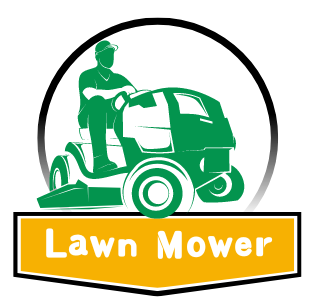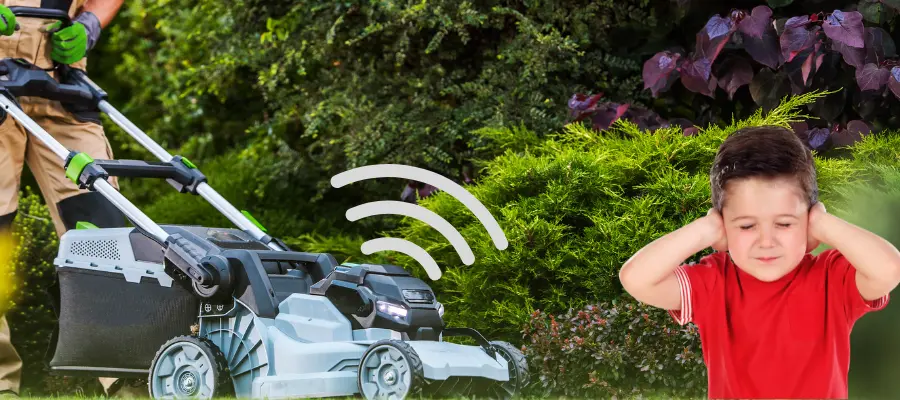Are you considering buying a lawn mower but worried about the noise it might make? You don’t want to disturb your neighbors or scare your child with a loud machine. If so, you’ve come to the right place.
In this article, we’ll discuss How Loud is a Lawn Mower, compare the noise levels of different types, and offer tips for choosing quieter options.
We’ll also explore the health implications of prolonged exposure to loud sounds and provide practical advice for reducing noise during your mowing sessions.
📌Understanding Sound Levels
Sound is measured in decibels (dB), a logarithmic unit that quantifies the intensity of sound. The scale starts at 0 dB, which represents the faintest sound the human ear can detect.
As the decibel level increases, the sound becomes exponentially louder. For example, a sound that measures 10 dB is ten times more intense than a sound at 0 dB, while a 20 dB sound is 100 times more intense.
Lawn mower noise typically falls somewhere between 60 dB and 110 dB, depending on the type and model. Understanding these noise levels is crucial for protecting your hearing and ensuring a comfortable mowing experience.
📌Different Types of Lawn Mowers and Their Noise Levels
Lawn mowers come in various types, each with distinct noise levels. Understanding the differences can help you choose a mower that suits your needs and minimizes noise pollution.
Electric Lawn Mowers

Electric lawn mowers are known for their quieter operation compared to gas-powered models. They typically produce noise levels between 60 and 70 dB.
This range is comparable to a normal conversation, making electric mowers a more neighbor-friendly option.
Benefits of Electric Mowers
Quieter operation: Electric mowers are significantly quieter, reducing the need for hearing protection.
Environmental benefits: They produce zero emissions, making them eco-friendly.
Lower maintenance: Fewer moving parts mean less upkeep and fewer mechanical issues.
Gas-Powered Lawn Mowers

Gas-powered lawn mowers are generally louder than electric ones, with noise levels ranging from 90 to 100 dB.
This level of noise can cause hearing damage if exposed for extended periods, so wearing hearing protection is recommended.
Benefits of Gas-Powered Mowers
Powerful performance: Gas mowers tend to have more power, making them suitable for large or tough lawns.
Longer run times: They can operate longer without needing a recharge.
Riding Lawn Mowers

Riding lawn mowers, often used for larger lawns, also generate significant noise, typically between 90 and 100 dB.
Despite their size, they often include larger mufflers which can slightly reduce noise levels compared to smaller gas mowers.
Benefits of Riding Mowers
Efficient for large areas: Ideal for big lawns and commercial use.
Comfortable operation: Many models offer comfortable seating and easy maneuverability.
Riding mowers are particularly advantageous for those who have extensive lawns or physical limitations that make push mowers impractical.
They offer additional features like adjustable cutting heights, multiple speed settings, and sometimes even built-in mulchers or baggers for grass clippings.
However, the comfort and convenience come at the cost of higher noise levels and more complex maintenance requirements.
📌How to test noise level of lawn mower by yourself?
If you want to test the noise level of a lawn mower yourself, here’s what you can do:
- Download any noise level checker app they are available on both Android and iOS.
- Choose a quiet location away from other noise sources.
- Start the lawn mower and let it run for a few minutes to reach its normal operating noise level.
- Use a sound level checker app to measure the noise produced by the lawn mower.
- Take multiple readings from different distances to get an accurate assessment of the noise level.
📌Health Implications of Lawn Mower Noise
Loud sounds can hurt the ears and cause hearing loss. This can be temporary or permanent depending on how long and how loud the noise is. Lawn mowers, especially the ones that run on gas, can be really loud. So, it’s important to wear something to protect your ears when using them.
Tips for Protecting Your Hearing
Use earplugs or earmuffs: Whenever you operate a loud mower, always wear hearing protection.
Limit exposure time: Try to reduce the amount of time you spend operating loud equipment.
Maintain your equipment: Well-maintained mowers often run more smoothly and quietly.
📌Choosing a Quieter Lawn Mower
When choosing a quieter lawn mower, consider the following factors:
Noise Level Ratings: Check the decibel ratings provided by the manufacturer.
Type of Mower: Electric mowers are generally quieter than gas-powered ones.
Engine Size and Type: Smaller engines and overhead valve (OHV) engines tend to be quieter.
Muffler Quality: High-quality mufflers can reduce noise levels significantly.
Conclusion: How Loud is a Lawn Mower
Understanding how loud is a lawn mower and taking steps to reduce noise can make mowing more enjoyable and protect your ears. By picking quieter equipment, wearing ear protection, and mowing carefully, you can keep a healthy and comfy atmosphere for you and others. Remember, whether you choose a quiet electric mower or a powerful gas one, it’s important to know about noise levels and their effects. Measure the noise, understand the health risks, and pick the best tools and methods to lower noise and work efficiently.

